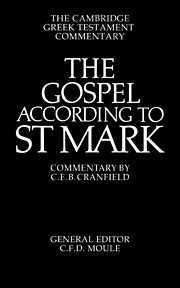Book contents
- Frontmatter
- Preface by the General Editor
- Contents
- List of Abbreviations
- Acknowledgements
- INTRODUCTION
- I AUTHORSHIP, DATE AND PLACE OF WRITING
- II THE CHARACTER OF THE GOSPEL
- III THE THEOLOGY OF THE GOSPEL
- IV TEXTUAL CRITICISM OF THE GOSPELS
- NOTES
- SUPPLEMENTARY NOTES
- REVISED ADDITIONAL SUPPLEMENTARY NOTES
- Addenda
- Index
II - THE CHARACTER OF THE GOSPEL
Published online by Cambridge University Press: 15 March 2010
- Frontmatter
- Preface by the General Editor
- Contents
- List of Abbreviations
- Acknowledgements
- INTRODUCTION
- I AUTHORSHIP, DATE AND PLACE OF WRITING
- II THE CHARACTER OF THE GOSPEL
- III THE THEOLOGY OF THE GOSPEL
- IV TEXTUAL CRITICISM OF THE GOSPELS
- NOTES
- SUPPLEMENTARY NOTES
- REVISED ADDITIONAL SUPPLEMENTARY NOTES
- Addenda
- Index
Summary
ITS IMPORTANCE
After exercising an extensive influence for a time, during which it was used by the writers of the First and Third Gospels, and probably also the Fourth, St Mark's Gospel suffered relative neglect for centuries. That this was so is hardly surprising; for, when compared with the other gospels, Mark was clearly at a disadvantage. It contained very little that was not also to be found in Matthew, while Matthew contained much additional matter of great value. Its roughness of style made it less suitable than the other gospels for liturgical use; and both for liturgical and for catechetical purposes its arrangement was less satisfactory than that of Matthew and Luke. It was not the work of an apostle, as Matthew and John were both thought to be. The fact that it was the first gospel to be written was soon forgotten. Irenaeus dates its composition after that of Matthew (adv. Haer. III i. i), while Augustine actually speaks of Mark having followed Matthew tamquam pedisequus et breviator eius (de Cons. Evang. i. ii. 4); and until the nineteenth century, during the course of which the hypothesis of the priority of Mark established itself, this view prevailed unchallenged. Not unnaturally Mark was the least read and least commented on of all the gospels.
But the discovery of Mark's priority transformed the situation. Since the end of last century its importance as the earliest gospel and the primary source of information about the ministry of jesus, the study of which is fundamental to the study of the other gospels, has been widely acknowledged.
- Type
- Chapter
- Information
- The Gospel according to St MarkAn Introduction and Commentary, pp. 10 - 21Publisher: Cambridge University PressPrint publication year: 1959



